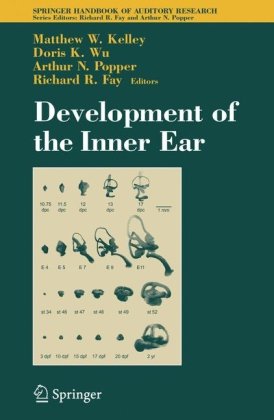

Most ebook files are in PDF format, so you can easily read them using various software such as Foxit Reader or directly on the Google Chrome browser.
Some ebook files are released by publishers in other formats such as .awz, .mobi, .epub, .fb2, etc. You may need to install specific software to read these formats on mobile/PC, such as Calibre.
Please read the tutorial at this link: https://ebookbell.com/faq
We offer FREE conversion to the popular formats you request; however, this may take some time. Therefore, right after payment, please email us, and we will try to provide the service as quickly as possible.
For some exceptional file formats or broken links (if any), please refrain from opening any disputes. Instead, email us first, and we will try to assist within a maximum of 6 hours.
EbookBell Team

4.0
96 reviews 
ISBN 10: 0387306781
ISBN 13: 9780387306780
Author: Matthew Kelley, Doris Wu, Richard R. Fay
The Springer Handbook of Auditory Research presents a series of compreh- sive and synthetic reviews of the fundamental topics in modern auditory - search. The volumes are aimed at all individuals with interests in hearing research including advanced graduate students, postdoctoral researchers, and clinical investigators. The volumes are intended to introduce new investigators to important aspects of hearing science and to help established investigators to betterunderstandthefundamentaltheoriesanddatain?eldsofhearingthatthey may not normally follow closely. Each volume presents a particular topic comprehensively, and each servesas a synthetic overview and guide to the literature. As such, the chapters present neither exhaustive data reviews nor original research that has not yet appeared in peer-reviewed journals. The volumes focus on topics that have developed a solid data and conceptual foundation rather than on those for which a literature is only beginning to develop. New research areas will be covered on a timely basis in the series as they begin to mature. Eachvolumeintheseriesconsistsofafewsubstantialchaptersonaparticular topic. In some cases, the topics will be ones of traditional interest for which there is a substantial body of data and theory, such as auditory neuroanatomy (Vol. 1) and neurophysiology (Vol. 2). Other volumes in the series deal with topics that have begun to mature more recently, suchasdevelopment,plasticity, and computational models of neural processing. In many cases, the series - itorsarejoinedbyaco-editorhavingspecialexpertiseinthetopicofthevolume.
Developmental Neurobiology of the Ear: Current Status and Future Directions
The Induction of the Otic Placode
Morphogenesis of the Inner Ear
Wiring the Ear to the Brain: The Molecular Basis of Neurosensory Development, Differentiation, and Survival
Notch Signaling and Cell Fate Determination in the Vertebrate Inner Ear
The Differentiation of Hair Cells
Developmental Genes Associated with Human Hearing Loss
development of the inner ear
where does the inner ear start
development of ear in fetus
role of the inner ear
development of inner ear embryology
Tags: Matthew Kelley, Doris Wu, Richard R Fay, Development, Inner Ear